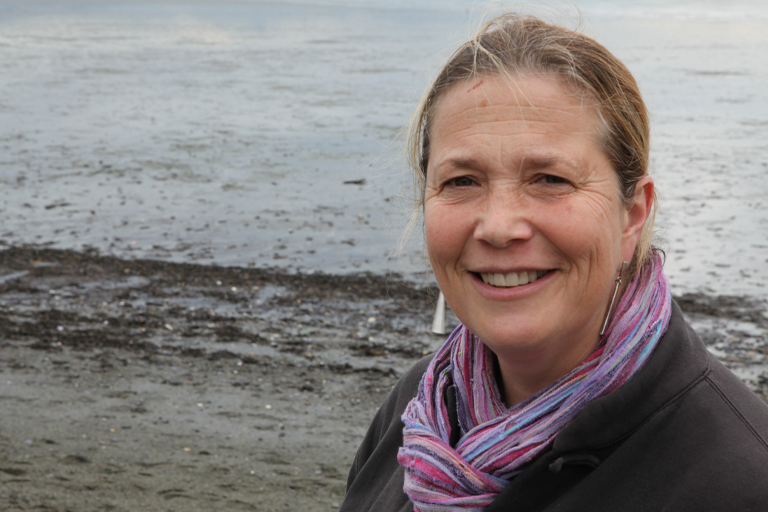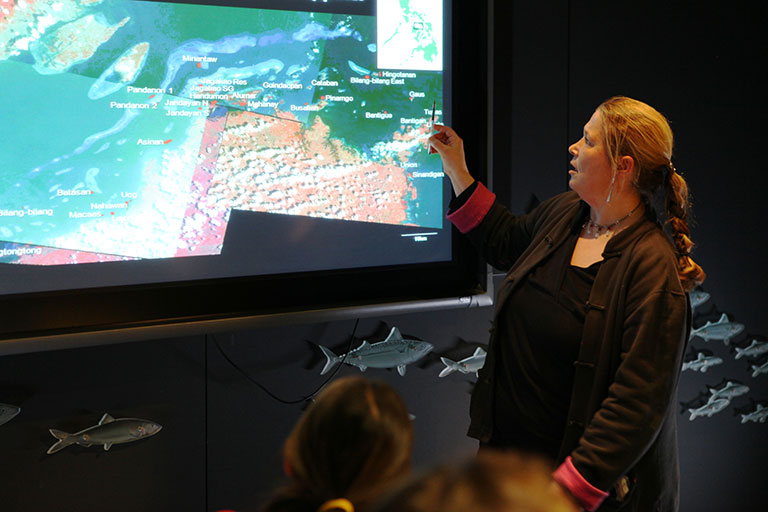Description of the video:
[Audio: music begins]
[Video: Pictures of boats in the water, Amanda I’m the boat in a wet suit.]
Amanda speaks in voiceover: The Indianapolis prize is considered to be the top award you can earn in animal conservation.
Amanda speaks to the camera: So, it is a little bit surreal to think Wow, Okay, I’m there.
[Video: Pictures of a beach, Amanda snorkeling, pictures of seahorses.]
Amanda speaks in voiceover: The fact that it is really garnering an international reputation and recognition will help a lot because then you have that on which a platform on which to speak about really vital, important issues. You can’t be dismissed as a marginal effort if you have won the Indianapolis Prize.
[Video: Pictures of a beach, Amanda snorkeling, pictures of seahorses.]
Man speaks in voiceover: Dr. Amanda Vincent was the first biologists to study seahorses under water. As the founder of project seahorse, Vincent spent the bulk of her early career under water, discovering the tiny, mysterious fish form permanent pair bonds.
Sarah Foster speaks to the camera: The very first things that we learned about seahorses in the oceans come from Amanda’s pioneering research. In doing that, she brought the magical world of the seahorse above water.
[Video: People underwater holding seahorses.]
Amanda speaks to the camera: We have a very unusual approach in our project seahorse team. Where we put seahorses at the center of the universe.
[Video: Footage of seahorses swimming in the water.]
Amanda speaks in voiceover: I think seahorses are a very potent flagship of species because they have such a readily unidentifiable charisma. When you reach out and tickle a seahorse’s tale and it lets go and grabs on to your hand and sits there, and stairs at you; they are so unreal. They’re mythical.
[Video: Footage of seahorses being sold in a market, Amanda walking into a market, talking to a man.]
Man speaks in voiceover: That mythology is a driving voice that keeps the seahorse on black markets around the world. Annually millions of seahorses are harvested for use in traditional medicine practices. Vincent has worked tirelessly to uncover illegal trade and has created relationships toward the sustainable harvesting of seahorses and other ocean wildlife.
Amanda speaks to a man at a store counter: They are saying that the seahorses in trade should be at least 10 centimeters height.
[Video: Footage of Amanda walks with another woman upstairs and down a hall, Amanda uses a device to measure a seahorse, she holds one up for the camera, she speaks to other people while looking at seahorse.]
Man speaks in voiceover: As the chair of the international union for conversation of nature seahorse specialist group, Vincent successfully fought to place the seahorse and other marine fishes on the IUCM’s red list. She then led the way for the listing of seahorses at the 2002 convention on international trade in endangered specifies of wild fauna and flora.
[Video: Video of seahorses in the ocean.]
Man speaks in voiceover: The first marine fish to be included in the convention since it was sign. As a consequence, the 182 signatory nation deities are required to regulate seahorse export for sustainability.
Nicholas Dulvy speaks to the camera: That was an unbelievable watershed in marine conservation.
[Video: Photos of fish in the ocean.]
Dulvy speaks in voiceover: It transformed our view of fish from being food to being biodiversity.
[Video: Footage of Amanda swimming in the ocean.]
Isabelle Cote speaks in voiceover: Seahorses I think were probably Amanda’s shrewdest move. If you reach the objective,
Isabelle Cote speaks to the camera: If you reach the objective of saving seahorses, having more seahorses somewhere you can …
[Video: Photos of Amanda by a boat]
Isabell Cote speaks in voiceover: achieve that by having a healthier marine habitat.
[Video: Photos of Amanda by a boat]
[Audio: music begins]
[Video: Footage of water and marine life, photos of Amanda speaking to people on the beach]
Man speaks in voiceover: Vincent’s trailblazing work with local governments and citizens lead the establishment of marine protected resources where seahorses live. The first she set up where in the Philippines with the models spreading to over 35 protected areas around the globe.
[Video: Photos of people on the beach, looking at a plans on a table]
Steve Palumbi speaks in voiceover: If you do it right, then that community tells the next all about it and the next one is easier.
Steve Palumbi speaks to the camera: That’s what’s made marine protected areas so commons in the Philippines. That villages see the benefits and they want one.
Amanda speaks to a class in a classroom: Fish are recovering, seahorses are getting larger. We couldn’t have done those except by generating.
[Video: Footage of Amanda walking with a group of people outside.]
Female speaks in voiceover: I don’t know how Amanda does everything that she does. She’s a mom to two children I guess she has a bigger plate than most of us.
Amanda speaks into the camera: There’s a long way to go and luckily, I have lots of life left in me to do it.
[Video: Video of Amanda sitting at a table with other women, walking outside, smiling at the camera.]
Amanda Vincent speaks in voiceover: We’ve put in decades and decades of hard work and developed innovative ways of tackling things in a very holistic approach to conversation that was perhaps not common when we started. The fact that is now being recognized as having really made a difference is special.
Indianapolis prize logo appears
The world’s quirky and iconic seahorses have quite a tale to tell. They face enormous conservation challenges and inspire solutions that matter globally.
Amanda Vincent, the 2021 Indianapolis Prize Winner, has spent her career working to save not only these distinctive sea creatures but also the world’s oceans. In fact, she is the first biologist to study seahorses in the wild, document their extensive, illegal trade and establish a project for their conservation.
Vincent, a self-proclaimed "ocean optimist" and professor at the Institute for the Oceans and Fisheries at The University of British Columbia, will share her work during an upcoming lecture taking place at 12 p.m., September 22 at Presidents' Hall.
The event, part of The Indianapolis Prize Lecture Series, is sponsored by IU's Vice President for Research, the Office of the Provost and the Indianapolis Prize.
"With so many challenges facing life on the planet, people want to know what conservation strategies will work for animals and humans. Amanda Vincent's Indianapolis Prize lecture is a great and unique opportunity to find out," said Beth Cate, clinical associate professor at the Paul H. O'Neill School of Public and Environmental Affairs. "Dr. Vincent is a trailblazer and strategic thinker who has successfully partnered with governments, industry, conservationists, local fishing families, and the public to develop sustainable seahorse fishing and trade practices that also help protect the broader marine environment. She uses every tool in the kit, from international trade rules to citizen science programs. Anyone who wants to know what they can do to help save species, or what others are doing that is making a real impact, should come hear Dr. Vincent speak."
Vincent's work with seahorses began when she wanted to understand how male pregnancy in seahorses informs our understanding of sex differences across animals. That curiosity led her to conduct the first underwater studies on seahorses. On discovering that seahorses were being heavily fished and traded, she launched Project Seahorse, a marine conservation organization that builds knowledge and translates it into effective action.
Vincent and her team pioneered conservation assessments of seahorses, which led them to catalyse the first global export regulations for marine fishes. Her team has worked in scores of countries to generate 35 protected areas, regulate a range of fisheries and create community science initiatives. She is credited with bringing the world's attention to the 44 known species of seahorses and developing an effective approach to conservation that has also improved the status of many other marine fishes, such as sharks, rays, groupers and eels.
Additionally, Vincent and Project Seahorse have trained more than 175 professional conservationists and inspired countless amateur conservation advocates to contribute to seahorse science and conservation through a citizen science program called iSeahorse. Because of her work, there are now active seahorse conservation projects across six continents.
Vincent's lecture at IU is part of the Indianapolis Prize Lecture Series taking place during September. The Indianapolis Prize is the largest monetary prize in the world for wildlife conservation and is given every other year to an individual who has made extraordinary contributions to wildlife conservation. The quarter-million dollar prize elevates the brave, talented and dedicated men and women who spend their lives protecting the Earth's wildlife.
Vincent is the eighth winner of the prize and the first to focus exclusively on marine conservation.
"It is a great honor to be named the 2021 Indianapolis Prize Winner. This prestigious global award allows me to advocate for vastly more attention to the ocean – which accounts for 99 percent of the living space on Earth – and all the species on which the marine ecosystem depends," said Vincent. "Through the perspective of seahorses, we have inspired many, many people globally to safeguard ocean life. The Indianapolis Prize now gives us an even bigger platform to invite and empower people to take meaningful conservation action."



